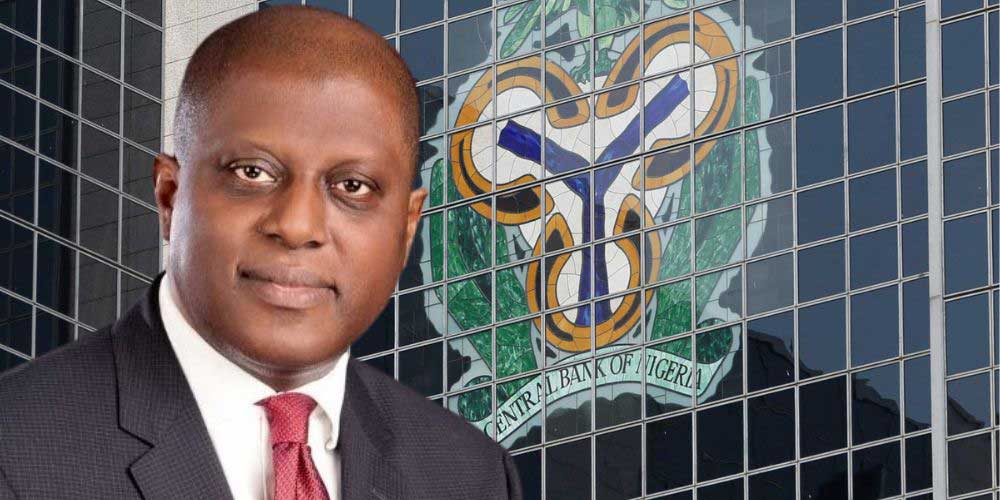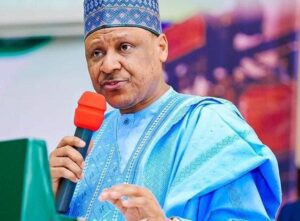

CBN delay in providing market guidance triggered naira fall — Afrinvest report
A report on the Nigerian Banking Sector Report in 2024 by Afrinvest Group has blamed the Central Bank of Nigeria (CBN) Governor, Olayemi Cardoso’s delay in providing market direction guidance to Forex dealers and investors as responsible to significant fall in the value of the naira.
The launch of the 2024 Nigerian Banking Sector Report by Afrinvest Group held in Abuja, on Wednesday. The event, themed “Banking Recapitalisation: Catalyst for $1 Trillion Economy,” attracted key stakeholders from the Nigerian banking sector.
The report said Cardoso failed to provide clear communication to the market in his first 60 days in office, forcing the FX market to capitulate to speculative activities.
It insisted that the year 2023 would go down in history as one of Nigeria’s most turbulent years on the exchange rate front.
“On June 14, the interim CBN leadership announced the collapse of all FX segments into the I&E window and re-introduced the “willing buyer, willing sellerî model, among others. This announcement, in its basic terms, implies the change in the FX management system to a “crawling pegî from “managed float,” the report.
It further disclosed that on the back of this development, the CBN official FX rate fell 29.0 per cent on June 14 to ¦ 660.04/$, thereby narrowing the differential between the parallel market and the official rate to N92.96 from N283.33 the prior day.
According to the report, by the end of June 2023, the differential between the official and parallel market rate has diminished to N2.75 – a level last seen in the pre-COVID period.
For instance, the official and parallel market rates, which closed the month of June at N769.25/$ and N772.00/$, respectively, weakened to N813.67/$ and ¦ 1,150.00/$ (differential: N336.33) on November 23.
By the time the Cardoso-led CBN administration would convene for its first Monetary Policy Committee meeting on February 25 and 26, 2024, the official and parallel market rates had weakened to record levels of N1,665.50/$ and N1,830.00/$, respectively.
Additional pressure points on the FX reserves, owing to the decline in total direct remittances, stagnated crude oil production and settlement of FX backlogs fuelled the escalation.
The report said that to salvage the situation, the CBN deployed numerous, but well-coordinated supply and demand, side management policies since the turn of 2024.
“While we commend the efforts of the CBN at addressing the FX challenges, its limited capacity to influence the supplyside factors remains the missing piece in Nigeria’s FX solution puzzle. Historically, net inflows from crude oil and gas exports and remittances were Nigeria’s FX reserves’ largest non-debt accretion sources,” it said.
“Since inflows from the crude oil & gas segment capitulated in 2015, the ability of the CBN to supply the market adequately has weakened. Worse still, policies (majorly fiscal) aimed at optimising local production capacity (especially, non-oil exports) over the last decade have largely been poorly implemented, thereby stoking a continued increase in the demand for imported goods and services,” the report said.
The report recommended effective execution of fiscal reforms that include solving the problems of insecurity, poor infrastructure, and. unfriendly business environment, stating that weak legal system remained the only foundation upon which the CBN coukd achieve a lasting solution to the recurring FX crises.
On banks’ performance, the report said banks gained N2.6tn from FX trading and revaluation owing to favourable net FX positions.
Also, “reformsî targeted at accelerating the cashless economy drove a sharp upturn in deposits, up 71.7 per cent to the highest levels in well over a decade and positioned banks to rake significant gains from Monetary Policy Rate hikes earlier in the year.
Speaking at the event, the Managing Director of Afrinvest Group, Mr. Ike Chioke, discussed the inception of the banking sector report in 2005, following the first recapitalisation programme. “Our report aims to highlight the dynamics of the Nigerian banking sector. Investors should exercise caution and thoroughly evaluate opportunities before investing in the current recapitalisation exercise,” he advised.
Chioke acknowledged the challenging macroeconomic environment but underscored the importance of data-driven economic management. “Despite the potential national strike, the data is available to run the economy effectively,” he stated.
On recapitalisation, the report said the Nigerian banking sector had witnessed several recapitalisation episodes in a bid to shore up minimum capital required to compete locally and globally.
It said the most recent round of recapitalisation was targeted at strengthening the financial system and aiding the government’s $1tn economy by 2030.
Away from the agenda, this became pertinent following the clear erosion of banks’ capital buffer post-2010 from a real and FX perspective compared to 2010 levels.
“Using 2023 average, the existing minimum capital size has lost 77.1 per cent and 76.5per cent in FX and real terms, respectively. To shore up the capital gap, the CBN considered the impact of macroeconomic headwinds on banks’ risk profiles and financial positions in defining the new threshold,” it said.
Regarding the practicality of fulfilling the new capital threshold, the CBN deviated from prior recapitalisation practice, having defined eligible capital as solely paid-up share capital and share premium while excluding other capital components (retained earnings, other reserves, and Tier-1 capital).
According to it, with a 24-month deadline to March 2026, banks are left to either inject the deficit capital through new issuance (public offer, right issues, and private placements) or structured capital injection from Holdco through debt or opt for M&A deals or upgrade/downgrade license category.
Overall, the report said efforts to reform a banking system, whether through financial liberalisation, recapitalisation, restructuring, enhanced regulation or technological innovations, are understood to have some positive bearing on broad economic progress.
Reacting to the report, experts insisted that the banking sector alone could not take Nigeria to the $1tn target.
The Chairman of the Presidential Fiscal Policy and Tax Reforms Committee, Mr. Taiwo Oyedele, called for comprehensive development in human capital, the power sector, industrialisation, agriculture, oil and gas, and the digital ecosystem to achieve its economic goals.
“For Nigeria to achieve a $1tn economy, it is not just the banking sector that needs to thrive; the capital market must also flourish. Our total national budget, including states and local governments, is less than $40bn. Efforts on revenue generation are currently misdirected, focusing on taxing the lower end of the ladder, such as small businesses. We need to reconfigure the tax system to place the burden in the right areas and explore revenue generation by disposing of government assets,” he said.
The Country Director of Development Alternative Incorporated, Dr. Joe Abah, called for effective national planning for accelerated development. “Nigeria’s development plans often amount to mere wishes. It is challenging to implement programmes or policies without proper planning. Our major hindrance is the delay in implementing economic recovery plans and government actions that sometimes obstruct economic growth,” Abah said.
He stressed the need for behavioural changes, improved productivity, and long-term strategies to achieve economic objectives. “Drafting plans without addressing these fundamental issues will not suffice. Deliberate and well-thought-out planning, including necessary legislative and cultural changes, are crucial for driving economic progress,” added Abah.
Cardoso, represented by a CBN Director, Mr. John Onoja, lauded Afrinvest for creating a platform for stakeholders to discuss the banking sector’s development. “The recapitalisation exercise aims to bring about price stability, promote sustainable and inclusive economic growth, and strengthen the banking sector to attract foreign investment, increase lending capacity, and withstand economic shocks,” he stated.
Cardoso assured foreign investors that their investments would be secure and free from devaluation risks. “We have taken steps to assure foreign investors that their funds will be safe and can be repatriated without devaluation,” he said.
Other experts said that achieving a $1TM economy requires a multifaceted approach that includes robust planning, sectoral development, and strategic economic reforms. They called for a unified effort to ensure Nigeria’s economic aspirations were met through comprehensive and well-coordinated strategies.




